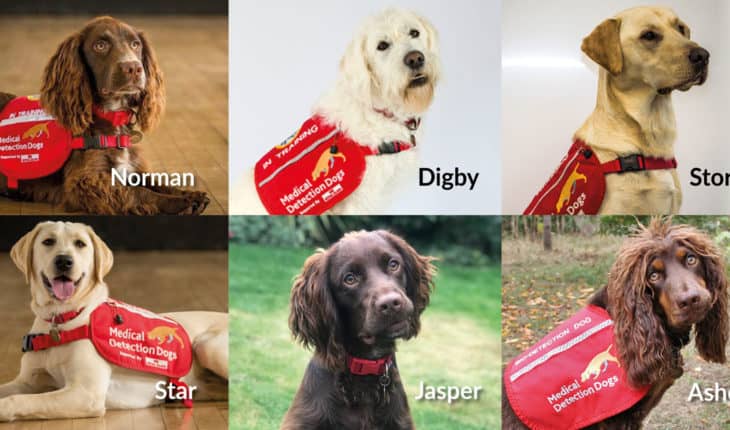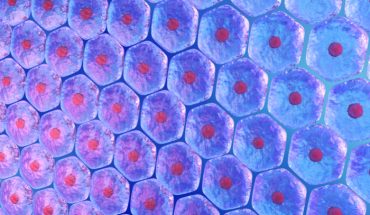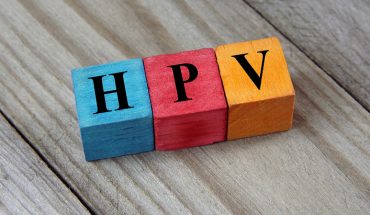Six canine faces look out at the camera. You would be forgiven for assuming they are modelling pet products – but, no, these animals are the first team to be trained by Medical Detection Dogs (MDD) to detect COVID 19.
The percentage of a dog’s brain that is devoted to analysing odours is 40 times larger than that of a human. The canine nose contains over 300 million scent receptors, which allow the dog to detect one part per trillion – the equivalent of a teaspoon of sugar in the water of two Olympic-sized swimming pools. With only 5 million scent detectors, most humans would struggle to identify one part in 1,000. Even an attempt by fragrance-creator, Jo Malone – whose sense of smell is exceptionally sensitive – could nowhere near match her canine equivalent.
All diseases are associated with bio-chemical changes that cause alterations in odours emanating from our bodies. Using their noses, the charity’s dogs work either as Medical Alert Assistance Dogs detecting a sudden deterioration in their owners’ complex health conditions and fetching the necessary life-saving medication, or as Bio Detection Dogs recognising volatiles in different diseases.
Dr Claire Guest has led the work of MDD for 15 years. She published her first paper, ‘Olfactory detection of human bladder cancer by dogs: proof of principle study’ in the BMJ in 2004. Encouraged by clinicians like consultant oncologist, Professor Karol Sikora, Universities and NHS Trusts have teamed with MDD to improve the speed of early cancer diagnosis. Detecting the signature odour associated with the disease can prevent unnecessary invasive tests.
MDD is exploring the possibility of a link between changes to a person’s microbiome and the development of cancer tumours and is about to deliver an accurate, rapid and non-invasive test to use alongside existing diagnostic methods. Meanwhile, MDD’s prostate cancer project spans the Atlantic, with research by a quantum physicist at MIT to Milton Keynes University Hospital. In the UK, the dogs’ role is to not only to detect the cancer, but distinguish between the slow-growing ‘pussycat’ and the aggressive ‘tiger’. The 36-needle biopsy may soon be a distant memory, as may another test, dreaded by patients – the colonoscopy. In collaboration with Hull University Teaching Hospitals NHS Trust, MDD is using urine samples instead to train the Dogs to detect colorectal cancer.
A proof of principle study with the Universities of Manchester and Edinburgh has shown that the Dogs can successfully detect Parkinson’s Disease early and MDD’s work – with Imperial – on specific bacteria linked to drug-resistant infections, could lead to a hospital detection dog screening the wards or alerting to infections in vulnerable patients.
The COVID 19 project by MDD is in collaboration with Durham University and LSHTM, with whom they have worked on a successful malaria project, proving that the dogs can detect the smell of malaria in asymptomatic children – from their socks. This offers the possibility of using the dogs to screen travellers – as will be the case with the COVID 19 dogs, who could also be deployed to public places such as airports.
Norman, Digby, Storm, Star, Jasper and Asher will take 0.5 of a second to detect the virus and will be able to screen up to 250 people per hour. Pieces of face-mask and nylon socks from infected and uninfected people will be used to train them – the virus will be deactivated and of no danger to the trainers or the dogs. Respiratory disease changes body odour, so it will be the body’s response to the mucous membrane inflammation caused by the virus that the dogs will detect.
The COVID 19 team is in training.
Find out more about the work of Medical Detection Dogs at www.medicaldetectiondogs.org.uk
Judith Potts is Founder of Esme’s Umbrella (www.charlesbonnetsyndrome.uk) for whom Medical Detection Dogs will be undertaking research. She is a freelance health writer who has written many articles about the work of the Dogs.
- Covid-19 canine detectives - 27th May 2020






